Name : Mr. Mahavir Singh Arya
District & State : Churu, Rajasthan
Category : Plant varieties
Award : Appreciation
Award Function : 4th National Grassroots Innovation Awards
Award Year : 2007
Innovation Description
Background
 Born in 1951, in a remote rural village, Neva of Churu district of Rajasthan, Mahavir Singh Arya, fought poverty to grow up into a successful farmer. With keen observation and tremendous hard work, he has today developed numerous varieties of wheat and mustard.Because of the prevailing poor financial conditions during his childhood, he could not continue his studies beyond class tenth. His father was a freedom fighter and well known as an enterprising farmer in the region. He also had good knowledge of herbs and traditional methods of treatment and used to provide treatment to patients, free of cost.It was during the British rule that their fields were confiscated and they were left with no land. Today he has less than a hectare land still he is famous in his region for getting bumper crop even from this small holding and for his innovative agricultural practices. Father of six, Arya admits that it has been difficult for him to sustain his family through the output generated from this land but he is determined to work out ways to maximise his yield by experimenting.Apart from working in his own field, he also works for the all round development of his region. He is an advocate for the use of organic method of farming and claims that he has never used any inorganic fertilizer in his field and still he has managed to generate good yield using organic manures. The palms of his hands bear a testimony to his hard work all these years.Apart from experimenting and developing new crop varieties in the field, Arya is also involved in herbal and traditional treatment of patients of his region; knowledge of which he has inherited from his father and some of which he has developed through his own interest and enterprise.He has a small but beautiful home in the village; has married off three of his daughters and rest of the children are studying in school. Already famous in his village and surrounding area as an enterprising farmer, seed producer and a simple man, Arya still puts in lots of efforts to develop new varieties of plants.Facing problems in his own village due to acute scarcity of water, he still tries and works in other farmer?s fields, some of whom are in neighboring villages, which itself is a huge task. This way he has managed to preserve some of the varieties developed by him. Even his request, to the Member of Parliament of his area and other officials, regarding the scarcity of water has not given any results.
Born in 1951, in a remote rural village, Neva of Churu district of Rajasthan, Mahavir Singh Arya, fought poverty to grow up into a successful farmer. With keen observation and tremendous hard work, he has today developed numerous varieties of wheat and mustard.Because of the prevailing poor financial conditions during his childhood, he could not continue his studies beyond class tenth. His father was a freedom fighter and well known as an enterprising farmer in the region. He also had good knowledge of herbs and traditional methods of treatment and used to provide treatment to patients, free of cost.It was during the British rule that their fields were confiscated and they were left with no land. Today he has less than a hectare land still he is famous in his region for getting bumper crop even from this small holding and for his innovative agricultural practices. Father of six, Arya admits that it has been difficult for him to sustain his family through the output generated from this land but he is determined to work out ways to maximise his yield by experimenting.Apart from working in his own field, he also works for the all round development of his region. He is an advocate for the use of organic method of farming and claims that he has never used any inorganic fertilizer in his field and still he has managed to generate good yield using organic manures. The palms of his hands bear a testimony to his hard work all these years.Apart from experimenting and developing new crop varieties in the field, Arya is also involved in herbal and traditional treatment of patients of his region; knowledge of which he has inherited from his father and some of which he has developed through his own interest and enterprise.He has a small but beautiful home in the village; has married off three of his daughters and rest of the children are studying in school. Already famous in his village and surrounding area as an enterprising farmer, seed producer and a simple man, Arya still puts in lots of efforts to develop new varieties of plants.Facing problems in his own village due to acute scarcity of water, he still tries and works in other farmer?s fields, some of whom are in neighboring villages, which itself is a huge task. This way he has managed to preserve some of the varieties developed by him. Even his request, to the Member of Parliament of his area and other officials, regarding the scarcity of water has not given any results.
Genesis
Mustard: In 1985, after visiting Hisar and seeing the crop varieties there, Arya, sowed T-59 variety of mustard in his field for the first time and then later in the same year he sowed the Golden variety seed brought from Delhi.It was during his visit to Hisar, where he saw the crop-growing pattern and learned the way crosses were made between varieties and selection was done. He tried crossing two varieties he had, T59 and Golden. The result was a new variety, which was named Sundari. Inspired by the success he got in his efforts, his interest in breeding grew and thereafter he made a point to visit various research institutions and universities, to keep himself updated.With time his knowledge and experience increased, he kept on learning tips from these places and repeated them experimentally in his field. His efforts paid dividend, as he was able to develop more than 10 new varieties of mustard by crossing the varieties available in and around Delhi.Wheat: In the year 1987, he met a Muslim trader from Uttar Pradesh who incidentally visited his village. Through him, he came to know about a tall, high yielding local variety of wheat growing in the region where the trader belonged.He requested him to get some seeds for him the next time he came. The trader obliged him by bringing for him the seeds the next time when he visited his village.He planted the seeds in small portion of his field and crossed it with a variety Sonalika he was already using. The next year, in the first generation of the cross, the farmer observed plants, which were taller, had bold grains and were resistant to disease.He selected plants with the desired characteristics like height of the plant, resistance to disease, etc., year after year and in 1990, developed a variety ?Mahavir Kisan Mahan? with stable characteristics. In the same way, he kept on crossing varieties obtained from different regions and various cooperatives with other local varieties and successfully developed more than fifteen varieties of wheat. The general process he followed while developing new varieties is briefly mentioned a) Selection of two varieties (based on quality and characteristics of interest) b) Crossing the two varieties c) Selection of plants with best quality and characters in F1 followed by selection for same characteristics for three-four generations (F2 ? F6) d) Naming and isolation of ?stable? varieties in terms of characteristics e) Distributing them to others for sowing.
Innovation
Crossing many local varieties, he developed many varieties of mustard, which include Mahavir Kishan Chandravarni, Mahavir Kishan Pittavarni, Mahavir Kishan Kanka, Mahavir Kishan Harsh, Mahavir Kishan Sunahari. The maturity period of all these varieties varies from 130 to 150 days and the yield from 18 quintals per hectare to 24 quintals per hectare. All the varieties are disease resistant and high yielding.Similarly, he has developed many wheat varieties too. Mahavir Kishan Mahan, Mahavir Kishan Vardan, Mahavir Kishan Kranti, Mahavir Kishan Vikash, Mahavir Kishan Pragati varieties are the prominent ones among them. The maturity period of all varies from 135-160 days, in case of Mahavir Kishan Pragati variety, the period is 95-110 days as it is a short duration variety. This particular variety is the only dwarf one among all, which are tall varieties. The yield of these varieties varies from 40-80 quintals per hectare. Mahavir Singh Arya?s daily routine involves spending most of the time in his field, selecting plants and crossing them. He is ably assisted and supported by all the members in his family. It is only when he has to uproot and discard many plants while making selection he has to face some resistance from his family. They complain about throwing those plants away, which have been produced after hard labour and care. He then explains the reason behind the selection process to them, in the process making them knowledgeable and passing on his experience too. Possessing good experience in agriculture, he is invited by other farmers for guidance and assistance, so, much of his time is spent in traveling too and this invokes criticism from his wife, as he is not able to devote enough time to the family. However, the family understands his devotion to the cause and supports him in his activities. They wish he were able to help maximum people and make a name for himself and as a result making them proud too. They know he has been working hard for the past many years and hope that he becomes famous one day.Keeping their expectations firmly grounded, they wish to have a tube well in the village so that everyone is benefited and they are able to carry on their own research work, without any hinderance.
http://nif.org.in/innovation/Improved_varieties_of_wheat_and_mustard/372
